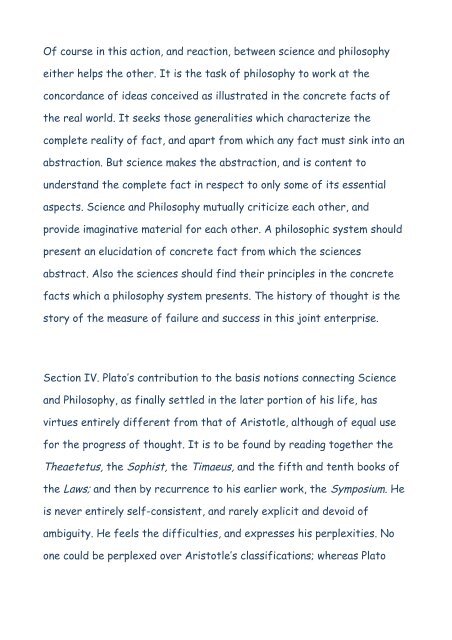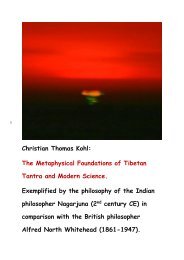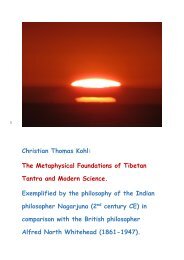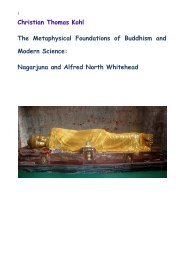Christian Thomas Kohl The Metaphysical Foundations of Buddhism and Modern Science
Christian Thomas Kohl The Metaphysical Foundations of Buddhism and Modern Science
Christian Thomas Kohl The Metaphysical Foundations of Buddhism and Modern Science
Create successful ePaper yourself
Turn your PDF publications into a flip-book with our unique Google optimized e-Paper software.
Of course in this action, <strong>and</strong> reaction, between science <strong>and</strong> philosophy<br />
either helps the other. It is the task <strong>of</strong> philosophy to work at the<br />
concordance <strong>of</strong> ideas conceived as illustrated in the concrete facts <strong>of</strong><br />
the real world. It seeks those generalities which characterize the<br />
complete reality <strong>of</strong> fact, <strong>and</strong> apart from which any fact must sink into an<br />
abstraction. But science makes the abstraction, <strong>and</strong> is content to<br />
underst<strong>and</strong> the complete fact in respect to only some <strong>of</strong> its essential<br />
aspects. <strong>Science</strong> <strong>and</strong> Philosophy mutually criticize each other, <strong>and</strong><br />
provide imaginative material for each other. A philosophic system should<br />
present an elucidation <strong>of</strong> concrete fact from which the sciences<br />
abstract. Also the sciences should find their principles in the concrete<br />
facts which a philosophy system presents. <strong>The</strong> history <strong>of</strong> thought is the<br />
story <strong>of</strong> the measure <strong>of</strong> failure <strong>and</strong> success in this joint enterprise.<br />
Section IV. Plato’s contribution to the basis notions connecting <strong>Science</strong><br />
<strong>and</strong> Philosophy, as finally settled in the later portion <strong>of</strong> his life, has<br />
virtues entirely different from that <strong>of</strong> Aristotle, although <strong>of</strong> equal use<br />
for the progress <strong>of</strong> thought. It is to be found by reading together the<br />
<strong>The</strong>aetetus, the Sophist, the Timaeus, <strong>and</strong> the fifth <strong>and</strong> tenth books <strong>of</strong><br />
the Laws; <strong>and</strong> then by recurrence to his earlier work, the Symposium. He<br />
is never entirely self-consistent, <strong>and</strong> rarely explicit <strong>and</strong> devoid <strong>of</strong><br />
ambiguity. He feels the difficulties, <strong>and</strong> expresses his perplexities. No<br />
one could be perplexed over Aristotle’s classifications; whereas Plato


















